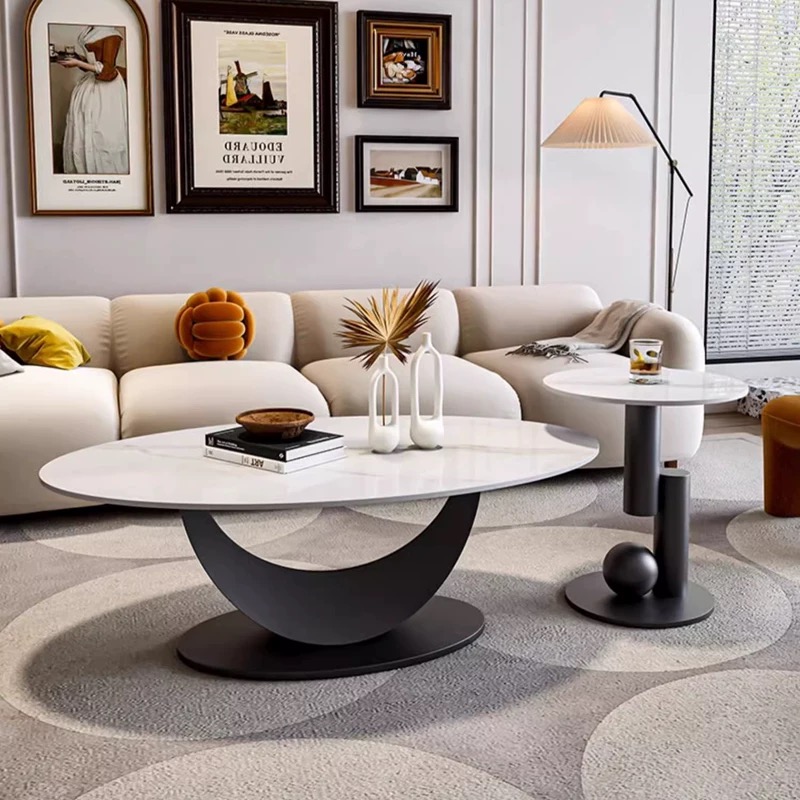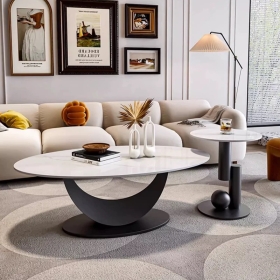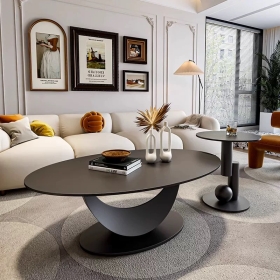Light Luxury Oval Rock Slab Coffee Table: Elevating Modern Design
The Rock Slab Coffee Table combines luxury and functionality, making it an ideal choice for contemporary interiors. Featuring a smooth, oval shape, this coffee table effortlessly enhances any space with its elegant design. Its carbon steel base not only provides solid support but also adds a sleek, modern touch to the overall look. Whether placed in a stylish living room or a high-end office, it brings sophistication to your environment.
The Coffee Table is crafted from the finest materials, blending the natural beauty of a slate with the industrial appeal of carbon steel. The rock slab’s surface is carefully polished to reveal striking patterns, making each table truly unique. Meanwhile, the strong carbon steel base ensures stability and durability, offering a perfect balance of form and function.
Why Choose the Oval Rock Slab Coffee Table?
The oval shape of this coffee table offers a soft and elegant appearance that works well in any modern setting. The rock slab top adds depth and texture to the design, while the carbon steel base ensures long-lasting strength. Its versatility makes it suitable for various environments, from luxury homes to upscale commercial spaces.
In any room, this coffee table stands out as a functional and decorative centerpiece. It combines natural materials with industrial design, creating a refined atmosphere. Whether used in a living room, office lounge, or hotel suite, it complements both bold and minimalist styles.
Dimensiones:
Materials:
-
Rock Slab Top
-
Carbon Steel Base
With the Rock Slab Coffee Table, you’re not just adding a piece of furniture to your space—you’re bringing a timeless element that blends beauty and practicality. This table is designed to elevate the look of any room while providing lasting functionality.





How to Ship Furniture from China?
Shipping costs can represent a significant portion of the landed cost of your goods. Properly managing the transportation process will help you reduce overall expenses.
Full Container Load (FCL) vs. Less Than Container Load (LCL)
-
FCL (Full Container Load) refers to shipping a full container, which is generally the most cost-effective method, especially for larger shipments. A 40-foot container, for example, offers substantial savings in comparison to other shipping methods.
-
LCL (Less Than Container Load) involves shipping goods that don’t fill a full container, meaning your goods will share space with other shipments. While LCL can be more expensive, it’s a suitable option for smaller shipments. Sin embargo, LCL comes with additional fees. Unless you have urgent shipments, it's generally better to opt for FCL.
That said, there are exceptions. Sometimes, LCL may be cheaper than FCL, especially when ocean freight rates are unreasonable (e.g., during the second half of 2020), or if you're considering a 20-foot container, in which case LCL can be more cost-effective.
Choosing the Right Incoterms
When engaging in international trade, it’s crucial to understand the main Incoterms used: EXW, FCA, FOB, CIF, DAP, DDP. Each term outlines the responsibilities of both the buyer and the seller, and choosing the right one impacts both cost and risk.
- FOB (Free On Board) is the most common term, but some furniture buyers prefer CIF or DDP (Delivered Duty Paid).
- In the case of LCL shipments, many factories only accept EXW (Ex-Works) terms, meaning you’ll need to handle the pickup from the factory warehouse and manage the rest of the logistics yourself.
Collaborating with a Reliable Freight Forwarder
International shipping is a complex process with potential delays and unforeseen issues. Partnering with a reputable freight forwarder who understands the import process can help you navigate challenges smoothly. It’s advisable to find a local agent familiar with your country’s import regulations.
How to Calculate Landed Costs
Landed cost is essential in determining whether your pricing strategy is suitable for your furniture business. It typically includes the following:
- Product cost.
- Local charges and customs fees at the supplier’s location (if EXW terms are used).
- Ocean freight.
- Insurance.
- Import duties and taxes.
- Destination local charges.
Landed costs can vary depending on the destination country. Would you like to review your specific landed costs? Feel free to get in touch, and we can discuss it further.
Shipping Documentation
Proper documentation is a key component of international shipping. Before booking a container, ensure you have all required documents ready:
- Commercial invoice and packing list.
- Bill of lading.
- Certificate of origin.
- If your goods involve wooden packaging, a fumigation certificate might be required.
- Any additional documents related to your custom orders.
Tip: For certain countries, such as Australia, Pakistan, and Southeast Asia, buyers may be eligible for tax exemptions or reductions if the supplier can provide an FTA (Free Trade Agreement) certificate of origin. Be sure to ask your supplier.
Shipping Timeframes
Understanding the shipping timeline is critical to planning your inventory. Consider these three factors:
-
Production time: Furniture items like sofas or bed frames typically take 20-30 days to manufacture, while flat-pack items usually take 40-60 days.
-
Shipping duration: Depending on the destination, shipping can take anywhere from one week to 40 days.
-
Delays: Unexpected delays may occur due to factors such as container shortages or customs inspections. While these are out of your control, it's best to prepare for such contingencies.





 Furnventa al por mayor
Furnventa al por mayor




















